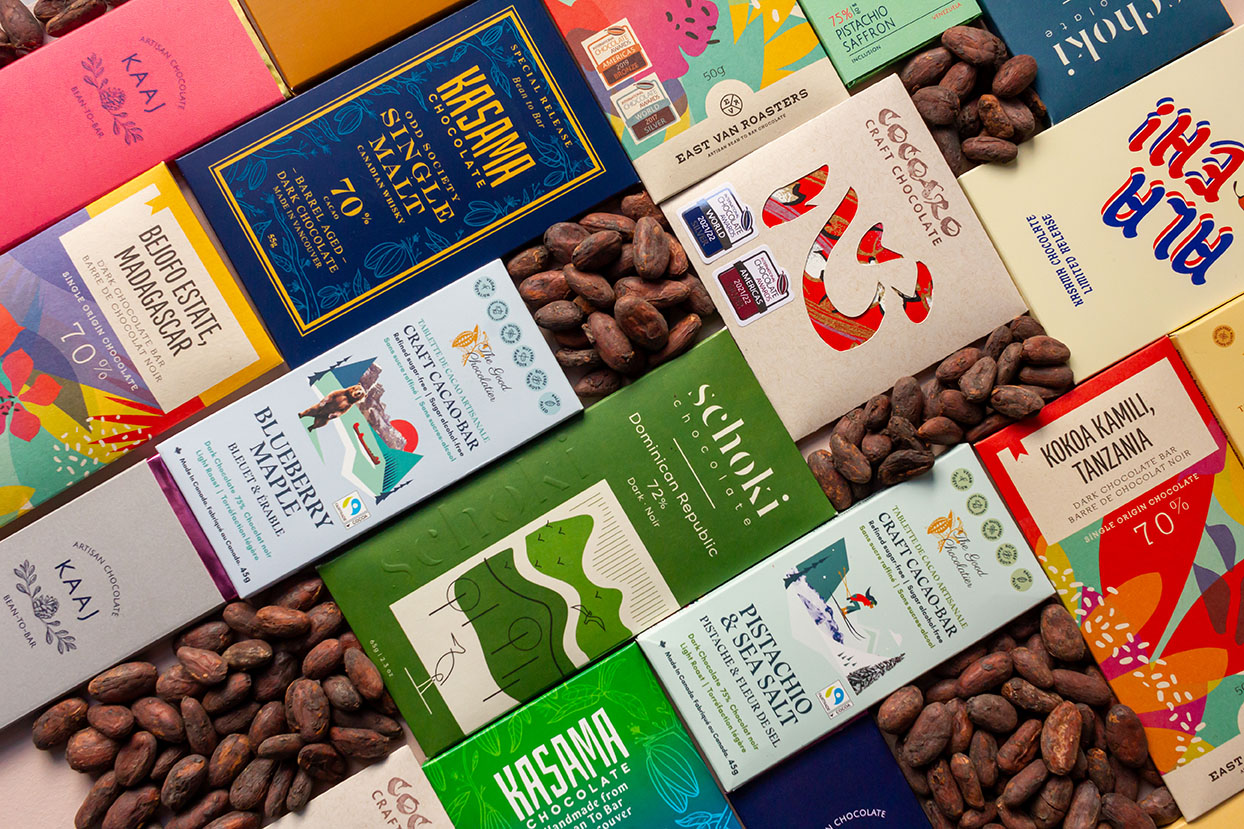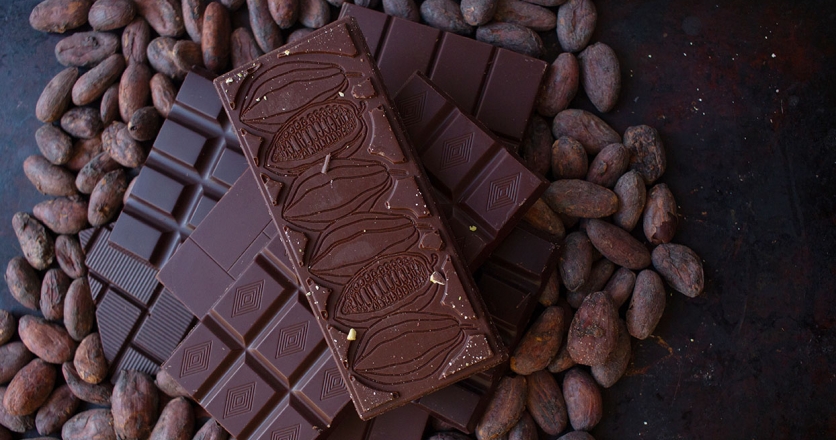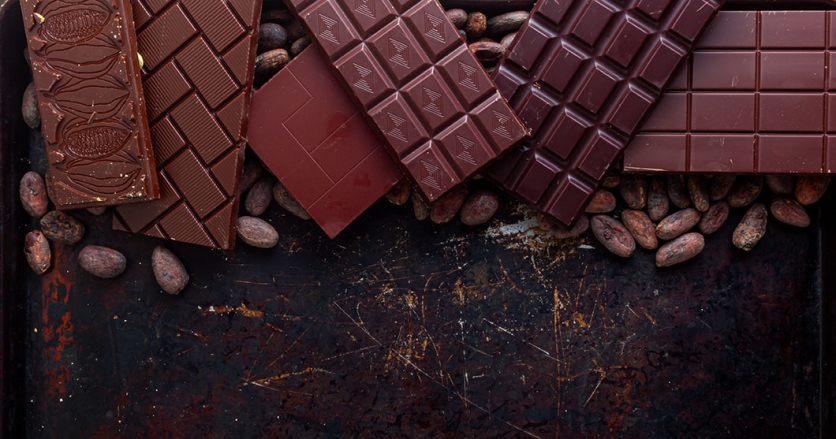Raising the Bar
Shelley Bolton was one of the first to embrace bean-to-bar chocolate-making in the area when she founded East Van Roasters in 2012. The social enterprise provides employment opportunities for women living in the Downtown Eastside.
Cacao beans are grown, fermented and dried in their countries of origin. East Van Roasters receives the beans in big burlap sacks and sorts them by hand prior to roasting. Its employees remove the outer shells in a process called winnowing and then grind the nibs for several days before they’re turned into molten chocolate. Sugar is added, the chocolate is tempered and cooled in molds.
The mission hasn’t changed. “We measure our impact through the stories of the women in this program and that continues to this day. We still have people contacting us 10 years later, telling us what a change in their lives they experienced by being in our program.” She urges consumers to understand “the power you have with your purchasing dollar. It’s easy to see that impact at East Van Roasters.”
The Good Chocolatier, also a social enterprise, provides work to neurodivergent adults in partnership with PALS Adult Services Society and Pacific Autism Family Network. Founder and head chocolatier Mara Mennicken highlights the extent to which cacao is at the heart of things in her aptly named cacao bars. “The first thing you taste is cacao,” says Mennicken, who begins her process with an imported cacao paste made from beans that have been lightly toasted. She emphasizes the healthy antioxidants present in cacao and uses sweeteners such as monk fruit, honey and maple syrup, avoiding refined sugars entirely. Employees of PASS assist with packaging.
“My mission is focused on hiring more neurodiverse adults,” says Mennicken adding, “It goes hand in hand with business growth.”
Flavour inspirations
“Pistachios are always at our table,” says Fatima Dariani, sales director of Kaaj Artisan Chocolate. The company, founded by Dariani with her husband, Mehdi Ale Mohammad and friends Fakhteh Ahmadi and Samy Lotfizadeh, draws inspiration from the Iranian heritage of the owners and ingredients of the Persian culinary canon, including saffron, pistachios, tea and rosewater. The company’s single origin bars are made with beans from Vietnam, Nicaragua and Venezuela. The bars are molded with an irregular pattern that makes it “snap” in a different way than a bar of uniform squares.
“Flavoured chocolate is more my style,” says Yoann Guidi, founder of Squamish-based Schoki Chocolate, who began making chocolate as a hobby to fill the down time during his two-week on, two-week off schedule as a search-and-rescue helicopter pilot. He began six years ago, inspired by the European style chocolate he grew up with and the then emerging bean-to-bar movement in California. He uses Vancouver Island Sea Salt, B.C. raspberries in his bars and milk powder from Avalon Dairy to make milk chocolate.
Transparent sourcing
Like many chocolate makers, East Van Roasters relies on the importer and its relationships with farms to ensure ethical sourcing. But Bolton has been able to visit many of the farms that grow the beans she buys.
“It was very important for me to verify,” she says. Today, the company purchases beans from two importers, who source from Peru, Madagascar, Dominican Republic, Guatemala and Tanzania. The company’s new packaging outlines each chocolate’s origin and gives details about the co-operatives that grow its cacao, including their involvement in reforestation and social programs.
For Schoki Chocolate, sourcing has been a path of learning. “At the beginning, I was trying to make chocolate, not knowing much about sourcing,” Guidi says. “The goal [now] is to be very transparent.”
The cacao beans Guidi uses for Schoki’s Dominican Republic 72 per cent cacao bar come from Reserve Zorzal, a cacao farm and bird sanctuary. He now also trades directly with the co-operative for the Nicaraguan cacao he buys.
Early experiments in chocolate triggered questions for Margaret Inoue, owner of Cocoaro Craft Chocolate. As she explored the process of making her own chocolate, she found answers that weren’t always positive.
“Chocolate does bring people joy,” Inoue says. “[But] it shouldn’t be at the expense of humanity on the other end.” Traceability is important to her, and she seeks it not only in the cacao beans she buys, but also in other ingredients such as vanilla and sugar. She also sources locally, using ginger from Broken Grain in Mission and cranberries from THE BOG, Riverside Cranberry Farm in Abbotsford. The strawberries in her signature strawberry shiso bar come from Mandair Farms and are freeze-dried by Origo Foods, and she grows the shiso herself. Besides local produce, Inoue draws inspiration from her Japanese heritage, which also shows up in the unique packaging made from chiyogami paper, complete with instructions about how to fold it origami-style into a heart, a nod to the play on a Japanese word meaning heart, behind the company name.
For Vincent Garcia, owner and co-founder of Kasama on Granville Island, chocolate sourcing is about direct relationships and highlighting a less well known cacao producing area — the Philippines. The company was founded by a group of friends who became accidental chocolate makers when Garcia’s father discovered cacao pods on their family land in the northern Philippines. The friends began playing around making chocolate in 2015 and were soon selling it. “We have access to a rare origin, directly,” Garcia says.
Kasama has extended its sourcing to other farms in the Philippines through several direct relationships. It also sources from other regions including Peru, Uganda, Costa Esmeraldas in Ecuador and Papua New Guinea via cacao importers. Garcia explains that none of the team had culinary or chocolate training and it freed the team members to experiment with flavours, equipment and methods. It certainly hasn’t hindered their success. In 2022, Kasama was the most awarded company in the Americas bean-to-bar and craft chocolate category at the International Chocolate Awards with 19 awards.
Connecting with community
Many of Vancouver’s chocolate makers are finding ways to connect within their communities. For Kaaj Artisan Chocolate, it’s been about attending local farmers’ markets. “That’s the place we’ve been able to connect with people and introduce our products,” Dariani says.
Kasama offers chocolate tours, bringing people into its Granville Island shop and walking participants through the bean-to bar process, ending with a tasting that Garcia calls “a trip around the world” via chocolate. The company also collaborates on bars with others. It uses ingredients from local suppliers, including Odd Society Single Malt, has created a Vietnamese coffee bar with restaurant Anh & Chi and a Chinese New Year bar with Olivia Wu of Noisette by Olivia.
Those wanting to learn how to make chocolate themselves can attend a workshop with The Good Chocolatier and leave with their own handmade bars or participate in a meditation class using traditional ceremonial cacao.
“It’s such a beautiful, heart-based industry,” Mennicken explains. “There is lots of exchange between chocolatiers.” Bolton has seen lots of new players come into the business, and while things are more competitive since she started, it has added to the diversity of the industry. “Give 10 different chocolate makers the same bag of beans and tell them to make a 70 per cent bar and you’ll get 10 different bars.”
Cocoaro Craft Chocolate
538 Victoria St., New Westminster, B.C.
cocoaro.ca | @cocarocraftchocolate
East Van Roasters
16 West Hastings St., Vancouver, B.C.
eastvanroasters.com | 604.629.7562 | @eastvanroasters
Kasama Chocolate
2-1244 Cartwright St., Vancouver, B.C.
kasamachocolate.com | 236.455.2490 | @kasamachocolate
Kaaj Artisan Chocolate
kaajchocolate.com | 778.775.8767 |@kaajchocolate
Schoki Chocolate Inc.
schokichocolate.com | @schokichocolate
The Good Chocolatier
1978 West Broadway, Vancouver, B.C.
(Inside Green’s Organic & Natural Market)
thegoodchocolatier.com | @thegoodchocolatier







